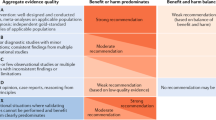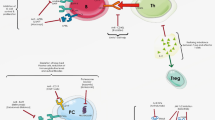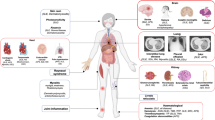Abstract
Recurrent pericarditis is one of the most frequent pericardial diseases, affecting up to 30% of the patients who have experienced acute pericarditis. While the diagnosis of acute pericarditis is sometime straight forward, its etiology and therapeutic management are still a challenge for physicians. In developed countries, the idiopathic form is the most frequent, and the search for an infectious etiology is almost invariably negative. Nevertheless, since standard treatment with nonsteroidal anti-inflammatory drugs and colchicine is not always able to neutralize pericardial inflammation in recurrent pericarditis, anakinra, an IL-1 receptor antagonist, has been proposed as a possible therapeutic alternative for refractory forms. IL-1 is a cytokine that exerts a pivotal role in innate immunity and in the pathogenesis of some autoimmune diseases, such as rheumatoid arthritis, and in autoinflammatory disorders, as familial Mediterranean fever and cryopyrin-associated periodic syndromes. The successful management of patients with acute idiopathic recurrent pericarditis (IRP) needs a teamwork approach, where cardiologists, rheumatologists, clinical immunologists and internists are involved. In this review, we will discuss the clinical and therapeutical challenges of IRP both in adults and children from a clinical practice standpoint. We will also briefly illustrate the main pathogenic mechanisms of IRP to provide internists and cardiologists with the rationale for approaching the use of anakinra in selected clinical cases.



Similar content being viewed by others
References
Adler Y, Charron P, Imazio M, Badano L, Barón-Esquivias G, Bogaert J et al (2015) ESC Guidelines for the diagnosis and management of pericardial diseases: the Task Force for the Diagnosis and Management of Pericardial Diseases of the European Society of Cardiology (ESC) endorsed by: the European Association for Cardio-Thoracic Surgery (EACTS). Eur Heart J 36:2921–2964. https://doi.org/10.1093/eurheartj/ehv318
Imazio M, Gaita F, LeWinter M (2015) Evaluation and treatment of pericarditis: a systematic review. JAMA 314:1498–1506. https://doi.org/10.1001/jama.2015.12763
Brucato A, Brambilla G, Moreo A, Alberti A, Munforti C, Ghirardello A et al (2006) Long-term outcomes in difficult-to-treat patients with recurrent pericarditis. Am J Cardiol 98:267–271
Brucato A, Imazio M, Gattorno M, Lazaros G, Maestroni S, Carraro M et al (2016) Effect of anakinra on recurrent pericarditis among patients with colchicine resistance and corticosteroid dependence: the AIRTRIP randomized clinical trial. JAMA 316:1906–1912. https://doi.org/10.1001/jama.2016.15826
Buckley L, Viscusi MM, Van Tassell B, Abbate A (2017) Interleukin-1 blockade for the treatment of pericarditis. Eur Heart J Cardiovasc Pharmacother. https://doi.org/10.1093/ehjcvp/pvx018
LeWinter MM (2014) Clinical practice. Acute pericarditis. N Engl J Med 371:2410–2416. https://doi.org/10.1093/ehjcvp/pvx018
Imazio M, Gaita F (2015) Diagnosis and treatment of pericarditis. Heart 2101:1159–1168. https://doi.org/10.1136/heartjnl-2014-306362
Shakti D, Hehn R, Gauvreau K, Sundel RP, Newburger JW (2014) Idiopathic pericarditis and pericardial effusion in children: contemporary epidemiology and management. J Am Heart Assoc 7 3(6):e001483. https://doi.org/10.1161/jaha.114.001483
Kytö V, Sipilä J, Rautava P (2014) Clinical profile and influences on outcomes in patients hospitalized for acute pericarditis. Circulation 130:1601–1606. https://doi.org/10.1161/CIRCULATIONAHA114.010376
Imazio M, Cecchi E, Demichelis B, Chinaglia A, Ierna S, Demarie D et al (2008) Myopericarditis versus viral or idiopathic acute pericarditis. Heart Br Card Soc 94:498–501. https://doi.org/10.1136/hrt.2006.104067
Søgaard KK, Farkas DK, Ehrenstein V, Bhaskaran K, Bøtker HE, Sørensen HT (2017) Pericarditis as a marker of occult cancer and a prognostic factor for cancer mortality. Circulation 12(136):996–1006. https://doi.org/10.1161/CIRCULATIONAHA.116.024041
Imazio M, Brucato A, Cemin R, Ferrua S, Maggiolini S, Beqaraj F et al (2013) A randomized trial of colchicine for acute pericarditis. N Engl J Med 17(369):1522–1528. https://doi.org/10.1056/NEJMoa1208536
Imazio M, Brucato A, Cemin R, Ferrua S, Belli R, Maestroni S et al (2011) Colchicine for recurrent pericarditis (CORP): a randomized trial. Ann Intern Med 155:409–414. https://doi.org/10.7326/0003-4819-155-7-201110040-00359
Imazio M, Bobbio M, Cecchi E, Demarie D, Pomari F, Moratti M et al (2005) Colchicine as first-choice therapy for recurrent pericarditis: results of the CORE (COlchicine for REcurrent pericarditis) trial. Arch Intern Med 165:1987–1991. https://doi.org/10.1001/archinte.165.17.1987
Imazio M, Belli R, Brucato A, Cemin R, Ferrua S, Beqaraj F et al (2014) Efficacy and safety of colchicine for treatment of multiple recurrences of pericarditis (CORP-2): a multicentre, double-blind, placebo-controlled, randomised trial. Lancet Lond Engl 383:2232–2237. https://doi.org/10.1016/S0140-6736(13)62709-9
Brucato A, Valenti A, Maisch B (2017) Acute and recurrent pericarditis: still idiopathic? J Am Coll Cardiol 69:2775. https://doi.org/10.1016/j.jacc.2017.02.072
Cremer PC, Kumar A, Kontzias A, Tan CD, Rodriguez ER, Imazio M et al (2016) Complicated pericarditis: understanding risk factors and pathophysiology to inform imaging and treatment. J Am Coll Cardiol 29(68):2311–2328. https://doi.org/10.1016/j.jacc.2016.07.785
Imazio M (2014) Idiopathic recurrent pericarditis as an immune-mediated disease: current insights into pathogenesis and emerging treatment options. Expert Rev Clin Immunol 10:1487–1492. https://doi.org/10.1586/1744666X.2014.965150
Urowitz MB, Tselios K (2017) Cardiovascular and pulmonary manifestations of systemic lupus erythematosus. Curr Rheumatol Rev. https://doi.org/10.2174/1573397113666170704102444
Vianello F, Cinetto F, Cavraro M, Battisti A, Castelli M, Imbergamo S et al (2011) Azathioprine in isolated recurrent pericarditis: a single centre experience. Int J Cardiol 147:477–478. https://doi.org/10.1016/j.ijcard.2011.01.027
Imazio M, Brucato A, Pluymaekers N, Breda L, Calabri G, Cantarini L et al (2016) Recurrent pericarditis in children and adolescents: a multicentre cohort study. J Cardiovasc Med Hagerstown Md 17:707–712. https://doi.org/10.2459/JCM.0000000000000300
Caforio ALP, Brucato A, Doria A, Brambilla G, Angelini A, Ghirardello A et al (2010) Anti-heart and anti-intercalated disk autoantibodies: evidence for autoimmunity in idiopathic recurrent acute pericarditis. Heart Br Card Soc 96:779–784. https://doi.org/10.1136/hrt.2009.187138
Maestroni S, Di Corato PR, Cumetti D, Chiara DBLC, Ghidoni S, Prisacaru L et al (2012) Recurrent pericarditis: autoimmune or autoinflammatory? Autoimmun Rev 12:60–65. https://doi.org/10.1016/j.autrev.2012.07.023
Cantarini L, Vitale A, Lucherini OM, De Clemente C, Caso F, Costa L et al (2015) The labyrinth of autoinflammatory disorders: a snapshot on the activity of a third-level center in Italy. Clin Rheumatol 34:17–28. https://doi.org/10.1007/s10067-014-2721-0
Rigante D, Vitale A, Lucherini OM, Cantarini L (2014) The hereditary autoinflammatory disorders uncovered. Autoimmun Rev 13:892–900. https://doi.org/10.1016/j.autrev.2014.08.001
Cattalini M, Soliani M, Lopalco G, Rigante D, Cantarini L (2016) Systemic and organ involvement in monogenic autoinflammatory disorders: a global review filtered through internists’ lens. Intern Emerg Med 11:781–791. https://doi.org/10.1007/s11739-016-1466-y
de Torre-Minguela C, Mesa Del Castillo P, Pelegrín P (2017) The NLRP3 and pyrin inflammasomes: implications in the pathophysiology of autoinflammatory diseases. Front Immunol 8:43. https://doi.org/10.3389/fimmu.2017.00043
Brucato A, Shinar Y, Brambilla G, Robbiolo L, Ferrioli G, Patrosso MC et al (2005) Idiopathic recurrent acute pericarditis: familial Mediterranean fever mutations and disease evolution in a large cohort of Caucasian patients. Lupus 14:670–674. https://doi.org/10.1191/0961203305lu2197oa
Cantarini L, Lucherini OM, Brucato A, Barone L, Cumetti D, Iacoponi F et al (2012) Clues to detect tumor necrosis factor receptor-associated periodic syndrome (TRAPS) among patients with idiopathic recurrent acute pericarditis: results of a multicentre study. Clin Res Cardiol Off J Ger Card Soc 101:525–531. https://doi.org/10.1007/s00392-012-0422-8
Emmi G, Barnini T, Silvestri E, Milco D’Elios M, Emmi L, Prisco D (2014) A new case of idiopathic recurrent acute pericarditis due to R104Q mutation in TNFRSF1A successfully treated with anakinra: expanding the questions. Clin Exp Rheumatol 32:297 Epub 2013 Dec 2
Dodé C, André M, Bienvenu T, Hausfater P, Pêcheux C, Bienvenu J et al (2002) The enlarging clinical, genetic, and population spectrum of tumor necrosis factor receptor-associated periodic syndrome. Arthritis Rheum 46:2181–2188. https://doi.org/10.1002/art.10429
Lachmann HJ, Papa R, Gerhold K, Obici L, Touitou I, Cantarini L et al (2014) The phenotype of TNF receptor-associated autoinflammatory syndrome (TRAPS) at presentation: a series of 158 cases from the Eurofever/EUROTRAPS international registry. Ann Rheum Dis 73:2160–2167. https://doi.org/10.1136/annrheumdis-2013-204184
Imazio M, Spodick DH, Brucato A, Trinchero R, Adler Y (2010) Controversial issues in the management of pericardial diseases. Circulation 121:916–928. https://doi.org/10.1161/CIRCULATIONAHA.108.844753
Imazio M, Cecchi E, Demichelis B, Ierna S, Demarie D, Ghisio A et al (2007) Indicators of poor prognosis of acute pericarditis. Circulation 115:2739–2744. https://doi.org/10.1161/CIRCULATIONAHA.106.662114
Imazio M, Brucato A, Badano L, Charron P, Adler Y (2016) What’s new in 2015 ESC guidelines on pericardial diseases? J Cardiovasc Med Hagerstown Md 17:315–322. https://doi.org/10.2459/JCM.0000000000000358
Vasileiou P, Tsioufis C, Lazaros G, Hadziyannis E, Kasiakogias A, Stefanadis C et al (2014) Interleukin-8 as a predictor of acute idiopathic pericarditis recurrences. A pilot study. Int J Cardiol 1 172(3):e463–e464. https://doi.org/10.1016/j.ijcard.2014.01.029
Imazio M, Brucato A, Trinchero R, Spodick D, Adler Y (2009) Individualized therapy for pericarditis. Expert Rev Cardiovasc Ther 7:965–975. https://doi.org/10.1586/erc.09.82
Imazio M, Brucato A, Cumetti D, Brambilla G, Demichelis B, Ferro S et al (2008) Corticosteroids for recurrent pericarditis: high versus low doses: a nonrandomized observation. Circulation 118:667–671. https://doi.org/10.1161/CIRCULATIONAHA.107.761064
Moretti M, Buiatti A, Merlo M, Massa L, Fabris E, Pinamonti B et al (2013) Usefulness of high-dose intravenous human immunoglobulins treatment for refractory recurrent pericarditis. Am J Cardiol 1(112):1493–1498. https://doi.org/10.1016/j.amjcard.2013.06.036
Gaspari S, Marsili M, Imazio M, Brucato A, Di Blasi Lo Cuccio C, Chiarelli F et al (2013) New insights in the pathogenesis and therapy of idiopathic recurrent pericarditis in children. Clin Exp Rheumatol 31:788–794 (epub 2 Aug 2013)
Lazaros G, Vasileiou P, Danias P, Koutsianas C, Vlachopoulos C, Tousoulis D et al (2015) Effusive-constrictive pericarditis successfully treated with anakinra. Clin Exp Rheumatol 33:945 Epub 2015 Oct 30
Marcolongo R, Russo R, Laveder F, Noventa F, Agostini C (1995) Immunosuppressive therapy prevents recurrent pericarditis. J Am Coll Cardiol 26:1276–1279. https://doi.org/10.1016/0735-1097(95)00302-9
Raatikka M, Pelkonen PM, Karjalainen J, Jokinen EV (2003) Recurrent pericarditis in children and adolescents: report of 15 cases. J Am Coll Cardiol 42:759–764
Khandaker MH, Espinosa RE, Nishimura RA, Sinak LJ, Hayes SN, Melduni RM et al (2010) Pericardial disease: diagnosis and management. Mayo Clin Proc 85:572–593. https://doi.org/10.4065/mcp.2010.0046
Cantarini L, Lopalco G, Cattalini M, Vitale A, Galeazzi M, Rigante D (2015) Interleukin-1: Ariadne’s thread in autoinflammatory and autoimmune disorders. Isr Med Assoc J IMAJ 17:93–97
Emmi G, Talarico R, Lopalco G, Cimaz R, Cantini F, Viapiana O et al (2016) Efficacy and safety profile of anti-interleukin-1 treatment in Behçet’s disease: a multicenter retrospective study. Clin Rheumatol 35:1281–1286. https://doi.org/10.1007/s10067-015-3004-0
Vitale A, Insalaco A, Sfriso P, Lopalco G, Emmi G, Cattalini M et al (2016) A snapshot on the on-label and off-label use of the interleukin-1 inhibitors in Italy among rheumatologists and pediatric rheumatologists: a Nationwide Multi-Center Retrospective Observational Study. Front Pharmacol 7:380. https://doi.org/10.3389/fphar.2016.00380
Colafrancesco S, Priori R, Valesini G, Argolini L, Baldissera E, Bartoloni E et al (2017) Response to interleukin-1 inhibitors in 140 Italian patients with adult-onset Still’s disease: a Multicentre Retrospective Observational Study. Front Pharmacol 8:369. https://doi.org/10.3389/fphar.2017.00369
Fabiani C, Vitale A, Emmi G, Lopalco G, Vannozzi L, Guerriero S et al (2017) Interleukin (IL)-1 inhibition with anakinra and canakinumab in Behçet’s disease-related uveitis: a multicenter retrospective observational study. Clin Rheumatol 36:191–197. https://doi.org/10.1007/s10067-016-3506-4
Lazaros G, Antonatou K, Vassilopoulos D (2017) The therapeutic role of interleukin-1 inhibition in idiopathic recurrent pericarditis: current evidence and future challenges. Front Med 4:78. https://doi.org/10.3389/fmed.2017.00078
Picco P, Brisca G, Traverso F, Loy A, Gattorno M, Martini A (2009) Successful treatment of idiopathic recurrent pericarditis in children with interleukin-1beta receptor antagonist (anakinra): an unrecognized autoinflammatory disease? Arthritis Rheum 60:264–268. https://doi.org/10.1002/art.24174
Vassilopoulos D, Lazaros G, Tsioufis C, Vasileiou P, Stefanadis C, Pectasides D (2012) Successful treatment of adult patients with idiopathic recurrent pericarditis with an interleukin-1 receptor antagonist (anakinra). Int J Cardiol 160:66–68. https://doi.org/10.1016/j.ijcard.2012.05.086
Camacho-Lovillo M, Méndez-Santos A (2013) Successful treatment of idiopathic recurrent pericarditis with interleukin-1 receptor antagonist (anakinra). Pediatr Cardiol 34:1293–1294. https://doi.org/10.1007/s00246-013-0663-y
Scardapane A, Brucato A, Chiarelli F, Breda L (2013) Efficacy of an interleukin-1β receptor antagonist (anakinra) in idiopathic recurrent pericarditis. Pediatr Cardiol 34:1989–1991. https://doi.org/10.1007/s00246-012-0532-0
Massardier C, Dauphin C, Eschalier R, Lusson JR, Soubrier M (2014) Resistant or recurrent acute pericarditis: a new therapeutic opportunity? Int J Cardiol 177(2):e75–e77. https://doi.org/10.1016/j.ijcard.2014.09.192
Cantarini L, Lucherini OM, Cimaz R, Galeazzi M (2010) Recurrent pericarditis caused by a rare mutation in the TNFRSF1A gene and with excellent response to anakinra treatment. Clin Exp Rheumatol 28:802 Epub 2010 Oct 22
Camprubí D, Mitjavila F, Arostegui JI, Corbella X (2017) Efficacy of anakinra in an adult patient with recurrent pericarditis and cardiac tamponade as initial manifestations of tumor necrosis factor receptor-associated periodic syndrome due to the R92Q TNFRSF1A variant. Int J Rheum Dis 20:510–514. https://doi.org/10.1111/1756-185X.13029
D’Elia E, Brucato A, Pedrotti P, Valenti A, De Amici M, Fiocca L et al (2015) Successful treatment of subacute constrictive pericarditis with interleukin-1β receptor antagonist (anakinra). Clin Exp Rheumatol 33:294–295 Epub 2015 Jan 29
Schatz A, Trankle C, Yassen A, Chipko C, Rajab M, Abouzaki N et al (2016) Resolution of pericardial constriction with anakinra in a patient with effusive-constrictive pericarditis secondary to rheumatoid arthritis. Int J Cardiol 223:215–216. https://doi.org/10.1016/j.ijcard.2016.08.131
Finetti M, Insalaco A, Cantarini L, Meini A, Breda L, Alessio M et al (2014) Long-term efficacy of interleukin-1 receptor antagonist (anakinra) in corticosteroid-dependent and colchicine-resistant recurrent pericarditis. J Pediatr 164(1425–1431):e1. https://doi.org/10.1016/j.jpeds.2014.01.065
Jain S, Thongprayoon C, Espinosa RE, Hayes SN, Klarich KW, Cooper LT et al (2015) Effectiveness and safety of anakinra for management of refractory pericarditis. Am J Cardiol 116:1277–1279. https://doi.org/10.1016/j.amjcard.2015.07.047
Lazaros G, Vasileiou P, Koutsianas C, Antonatou K, Stefanadis C, Pectasides D et al (2014) Anakinra for the management of resistant idiopathic recurrent pericarditis. Initial experience in 10 adult cases. Ann Rheum Dis 73:2215–2217. https://doi.org/10.1136/annrheumdis-2014-205990
Lopalco G, Rigante D, Giannini M, Galeazzi M, Lapadula G, Iannone F et al (2016) Safety profile of anakinra in the management of rheumatologic, metabolic and autoinflammatory disorders. Clin Exp Rheumatol 34:531–538 (epub 26 Feb 2016)
Emmi G, Silvestri E, Squatrito D, Vitale A, Bacherini D, Vannozzi L et al (2017) Long-term efficacy and safety of anakinra in a patient with Behçet’s disease and concomitant tuberculosis infection. Int J Dermatol 56:218–220. https://doi.org/10.1111/ijd.13337
Şoyyiğit S, Kendirlinan R, Aydın O, Çelik GE (2014) Successful desensitization with anakinra in a case with immediate hypersensitivity reaction. Ann Allergy Asthma Immunol Off Publ Am Coll Allergy Asthma Immunol 113:325–326. https://doi.org/10.1016/j.anai.2014.06.017
Emmi G, Silvestri E, Cantarini L, Lopalco G, Cecchi L, Chiarini F et al (2017) Rapid desensitization to anakinra-related delayed reaction: need for a standardized protocol. J Dermatol 44:981–982. https://doi.org/10.1111/1346-8138.13619
Acknowledgements
The authors would like to thank Maria L. Urban, Alessandra Bettiol, Stefano Salvati, Chiara Marvisi and Valerio Maniscalco for their help in preparing tables and figures.
Author information
Authors and Affiliations
Corresponding author
Ethics declarations
Conflict of interest
The authors declare that they have no conflict of interest.
Statement of human and animal rights
This article does not contain any studies with human participants or animals performed by any of the authors.
Informed consent
None.
Rights and permissions
About this article
Cite this article
Brucato, A., Emmi, G., Cantarini, L. et al. Management of idiopathic recurrent pericarditis in adults and in children: a role for IL-1 receptor antagonism. Intern Emerg Med 13, 475–489 (2018). https://doi.org/10.1007/s11739-018-1842-x
Received:
Accepted:
Published:
Issue Date:
DOI: https://doi.org/10.1007/s11739-018-1842-x




